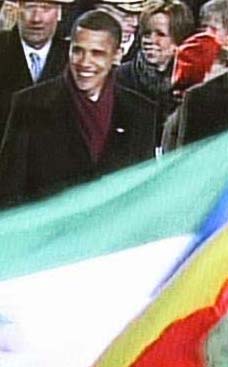
While Pakistan repeatedly has demanded that the U.S. halt the missile strikes, which began while George W. Bush was president, Qureshi used diplomatic language in the new appeal to the Obama administration. "We have to weigh both advantages and disadvantages," Qureshi said. "Our view is that these are counterproductive." Pakistan's appeal for more understanding from the U.S. underscored the difficulties President Barack Obama may face in achieving his goal of pushing Pakistan to crack down harder on Islamic militant groups, which the country's army supported in the past. Independent analysts and former U.S. counterterrorism officials say some Pakistani officers still help the militants. Journalist James Rupert, head of Bloomberg's international bureau in Islamabad, Pakistan began his career abroad as a Peace Corps volunteer, teaching mechanics and welding in Morocco.
James Rupert writes: Pakistan Asks U.S. to Reconsider Missile Strikes on Al-Qaeda
Pakistan Asks U.S. to Reconsider Missile Strikes on Al-Qaeda
Email | Print | A A A
By Khalid Qayum and James Rupert
Feb. 10 (Bloomberg) -- Officials in Islamabad told U.S. special envoy Richard Holbrooke that the Obama administration should reconsider the policy of firing missiles at suspected al- Qaeda fighters in Pakistan, saying the strikes are "counterproductive."
Holbrooke is in the region to review U.S. counterterrorism policies in Pakistan and neighboring Afghanistan. In talks today with Holbrooke, President Asif Zardari, Prime Minister Yousuf Raza Gilani and Foreign Minister Shah Mahmood Qureshi urged greater U.S. attention to Pakistan's political and security concerns.
"I am here to listen and learn the ground realities of this critically important country," the U.S. Embassy in Pakistan quoted Holbrooke as saying. Qureshi, speaking to reporters later, said, "This is a welcome change."
While Pakistan repeatedly has demanded that the U.S. halt the missile strikes, which began while George W. Bush was president, Qureshi used diplomatic language in the new appeal to the Obama administration. "We have to weigh both advantages and disadvantages," Qureshi said. "Our view is that these are counterproductive."
Pakistan's appeal for more understanding from the U.S. underscored the difficulties President Barack Obama may face in achieving his goal of pushing Pakistan to crack down harder on Islamic militant groups, which the country's army supported in the past. Independent analysts and former U.S. counterterrorism officials say some Pakistani officers still help the militants.
'Stalwart Ally'
Holbrooke, 67, began his visit a day after Obama said his administration aims "to make sure that Pakistan is a stalwart ally with us against this terrorist threat" in parts of the country controlled by the Taliban and allied Islamic militants. The Taliban and other guerrillas based in Pakistan's ethnic Pashtun tribal zone routinely attack U.S. and Afghan forces across the border.
The army, which ruled Pakistan for more than half of its 61 years of independence, still dominates national security policy. U.S. officials have said Pakistan's fight against the guerrillas often remains half-hearted.
"What we haven't seen is the kind of concerted effort to root out those safe havens that would ultimately make our mission successful," Obama said at a news conference yesterday.
Zardari's coalition government, led by the Pakistan Peoples Party, says Pakistan is doing all it can against the guerrillas. While Pakistan's army has sent troops to attack the Taliban in the Swat Valley and the Bajaur district in the north, it has left the Taliban in control of the strategic Waziristan region, farther south.
Predator Aircraft
U.S. forces have launched missiles from unmanned Predator aircraft flying over Pakistan's border zone with Afghanistan. They have carried out 32 such attacks in the past 10 months, Senator Raza Rabbani, minister for provincial coordination, told lawmakers last month, according to the News, a Pakistani daily newspaper.
Obama has underscored the danger from the resurgence of the Taliban in Afghanistan and is pushing European allies in the North Atlantic Treaty Organization to send more troops there. Army General David Petraeus, who commands U.S. forces in the Middle East and much of Asia, said Feb. 8 that security in Afghanistan has "deteriorated markedly" since 2007.
Obama appointed Holbrooke to coordinate U.S. diplomatic efforts to counter the Taliban, al-Qaeda and other Islamic militant groups in Pakistan and Afghanistan. Under the Clinton administration, Holbrooke was the chief architect of the 1995 Dayton accords, which ended the war in Bosnia that followed the collapse of Yugoslavia.
Shaping Policies
Holbrooke's trip will help him shape the administration's policies in Afghanistan, Pakistan and the surrounding region, said Daniel Markey, a South Asia specialist at the Council on Foreign Relations. "The next real direction on Afghanistan is wide open," Markey said.
Holbrooke also is scheduled to visit Afghanistan and India, U.S. officials said.
In India, U.S. officials are weighing whether to press the government for concessions to help settle the Indian-Pakistani dispute over the Kashmir region, which has helped to popularize jihadist guerrilla groups in Pakistan, Markey and other analysts said. India opposes foreign mediation in Kashmir.
To contact the reporters on this story: James Rupert in New Delhi at upert3@bloomberg.net; Khalid Qayum in Islamabad at kqayum@bloomberg.net.













